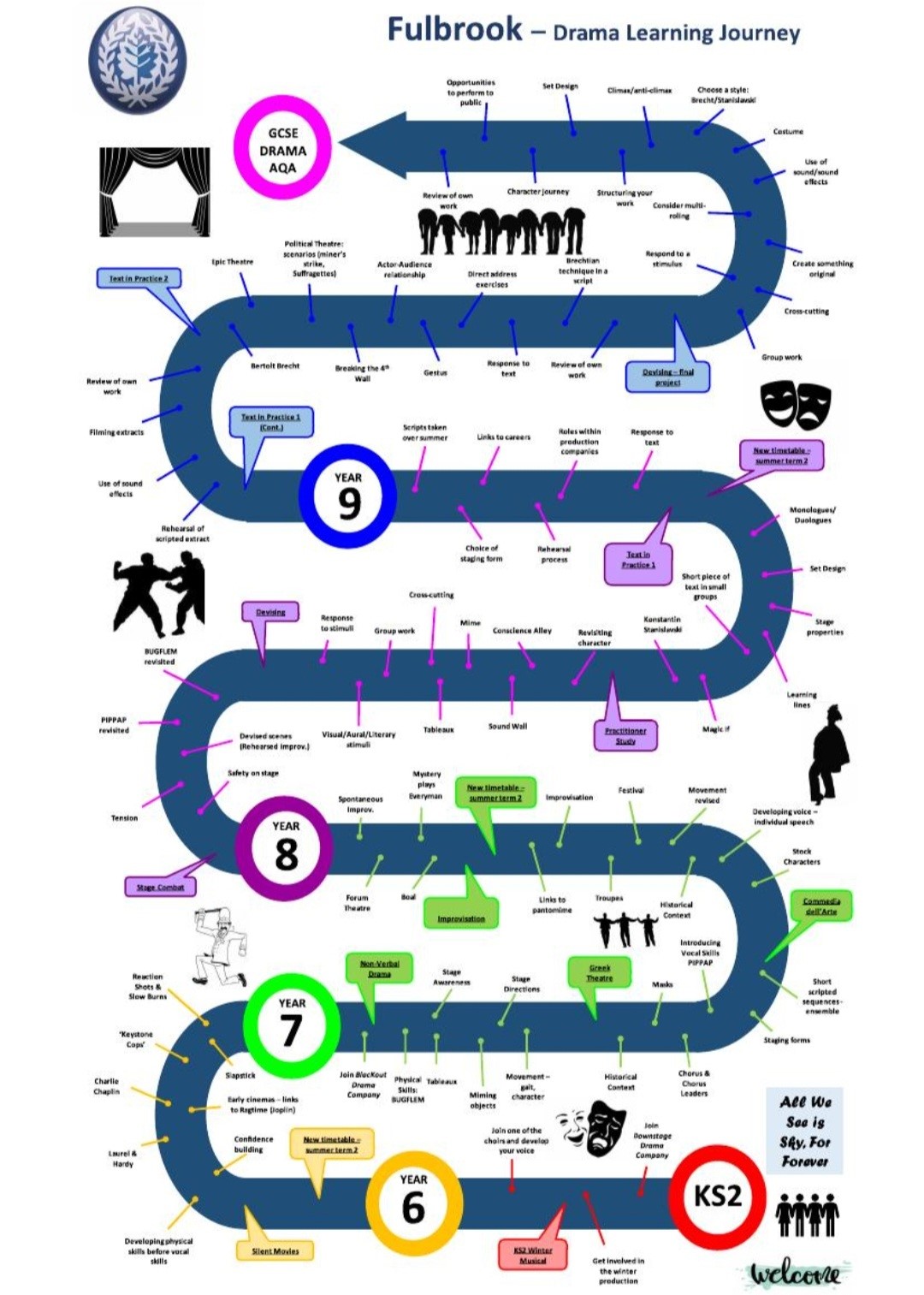Drama
Overview
Drama at Fulbrook sits within the Performance Arts Faculty. In addition to the school’s mantra of Aim High, Work Hard, Be Kind, No Excuses, our faculty lives by an ethos that there is no glass ceiling and that all students are provided with equal opportunities. This is captured by our faculty motto, a quote from Dear Evan Hansen, ‘All we see is sky for forever’.
Drama is delivered over three years at Key Stage 3 and taught to students for one hour per fortnight. We expect students to respond to tasks in a practical manner and strive to be creative and innovative in their responses.
The Performance Arts faculty at Fulbrook is a vibrant and exciting part of school life. There are lots of opportunities for students to engage with Drama, both in and out of the classroom.
Our extra-curricular programme currently offers a Key Stage 2 company (Downstage Drama Company) who have recently performed a superb winter musical, Panto Pandemonium. Our Key Stage 3 company (BlacKout Drama Company) recently staged a wonderful, devised piece based on the myth of Persephone and Hades, and a superb production of The Lion, the Witch & the Wardrobe. Our end of year, whole-school musical was High School Musical Jr.
Key Concepts
- - Developing a sense of confidence when working with others and developing ideas
- - Audience awareness
- - Devising from a given stimulus
- - Exploring texts
- - Developing characterisation
- - Increasing personal technique through six focus skills: Closer to Audience, Facial Expression, Body Language, Eye Contact, Face the front, Use of levels & space
- - Understanding dramatic styles and forms
Intent
- - To ensure the Drama department is a space for all students, regardless of ability or background, to engage with practical lessons that allow them to think, explore and react to scenarios presented to them.
- - To allow students the opportunity to develop their confidence and creativity through a variety of tasks presented to them.
- - To enable students to work in teams, developing important transferable skills that will equip them with confidence, empathy, and resilience in group situations.
Year 7
By the end of Year 7, students will have worked through non-verbal theatre, allowing them to develop an awareness of their physical skills (BUGFLEM) before adding their voices. Spoken voice (PIPPAP) will initially be added through the work of the Greek chorus, allowing more opportunities to develop confidence within the group, before students are required to speak on their own. Students will also be introduced to the history of theatre, including basic terminology such as stage directions and the ability to mime effectively.
Year 8
By the end of Year 8, students should an understanding of some major drama practitioners, such as Boal and Stanislavski. Students will have worked in groups to devise a piece of theatre that allows them to respond to a sensitive, historical event. They will also have had opportunities to learn about safety within practical areas such as stage combat. Students will also have had the opportunity to engage in their first ‘page to stage’ activity, working in groups to rehearse and produce a scene from a given text.
Year 9
By the end of Year 9, all students should have developed a secure understanding about how to portray a range of characters on stage, considering the social and historical context associated with a given text. Students will have enjoyed engaging with activities where they have devised and performed their own work, including the introduction of a new, non-naturalistic practitioner, Bertolt Brecht. All students will have the opportunity to choose GCSE Drama as an option, understanding the breadth and transferable skills the qualification can offer employers.
What you will see in Drama lessons
Drama is a practical subject, currently taught in our school hall, whilst the school undergoes its transformation to become an extended secondary school.
Students will be working practically on a wide range of scenarios, from improvisation to Commedia dell’arte, to exploring a chosen text. Each lesson will engage students in a warm-up, before looking at a given scenario. Students are encouraged to question their thoughts and try to view thoughts from someone else’s perspective. It is hoped that this will then encourage a greater creative response to a given practical task.
Written work is far more important at Key Stage 4 and it is likely that GCSE Drama students will spend chunks of their lessons debating, discussing and writing responses to questions or topics provided.
Key Stage 3 Drama Learning Journey










